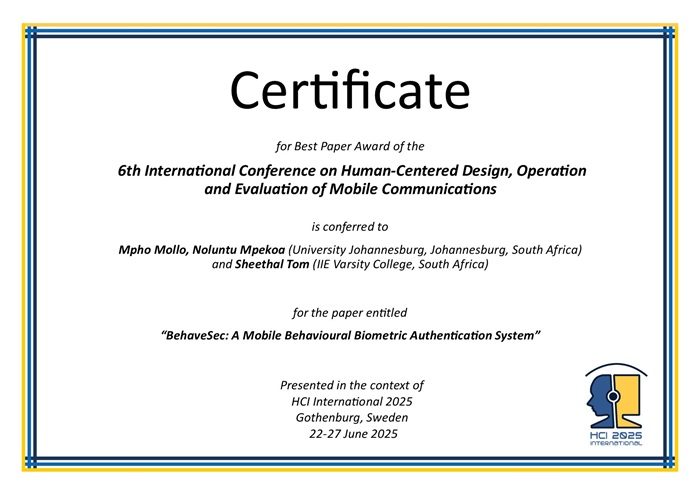The Best Paper Award of the 6th International Conference on Human-Centered Design, Operation and Evaluation of Mobile Communications
has been conferred to
Mpho Mollo, Noluntu Mpekoa, (University of Johannesburg, South Africa)
and Sheethal Tom, (IIE Varsity College, South Africa)
for the paper entitled
"BehaveSec: A Mobile Behavioural Biometric Authentication System"

Mpho Mollo
(presenter)

Best Paper Award for the 6th International Conference on Human-Centered Design, Operation and Evaluation of Mobile Communications, in the context of HCI International 2025, Gothenburg, Sweden, 22 - 27 June 2025

Certificate for Best Paper Award of the 6th International Conference on Human-Centered Design, Operation and Evaluation of Mobile Communications presented in the context of HCI International 2025, Gothenburg, Sweden, 22 - 27 June 2025
Paper Abstract
A considerable number of mobile phone devices are utilized globally for both personal and professional purposes. These devices house sensitive information that requires careful protection to ensure it remains secure from unauthorized access and potential threats. Given that these devices contain a substantial amount of sensitive information, they have garnered noticeable interest from cybercriminals, positioning them as appealing targets for potential attacks. In light of the growing concerns surrounding cyber threats, it has become essential to explore and adopt practical security measures that effectively align with the diverse ways in which devices are utilized. This research underscores the need for a more efficient solution that offers users continuous authentication by leveraging their application usage patterns through behavioral biometrics. The proposed solution, BehaveSec addresses this need by providing non-intrusive, real-time authentication by analysing user interaction with mobile applications. BehaveSec aims to enhance mobile phone security by monitoring user behavior for any deviations from established patterns. By identifying anomalies, BehaveSec proactively prevents potential cyber-attacks. The proposed solution comprises of an Android application on the front end and several machine learning models on the back end. A comparison was made on several machine learning models, specifically Logistic Regression, Support Vector Machines, and Random Forest. The models process the user data and analyze the data to verify authentication status. Accuracy, training time and validation loss were evaluated. The results highlight the trade-offs between these models and help recommend the most appropriate model based on the performance metrics for mobile behavioural biometrics. However, further precision and adaptive learning improvements are necessary to maintain effectiveness as user behaviour evolves.
The full paper is available through SpringerLink, provided that you have proper access rights.


